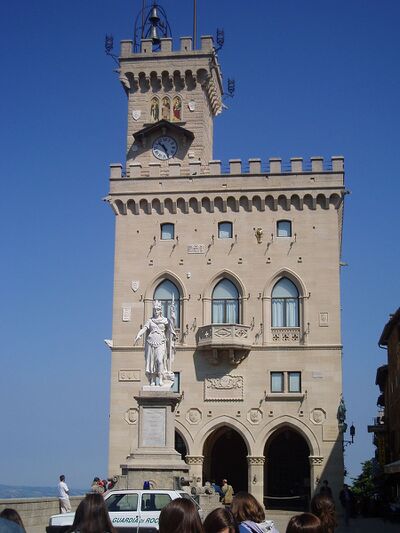Venland
Republic of Venland | |
|---|---|
| Capital | Bellun |
| Largest city | Lauchâtel |
| Ethnic groups (2020) | Venish |
| Religion | Roman Catholicism |
| Demonym(s) | Venish Ven |
| Government | Unitary parliamentary diarchic directorial republic |
• Consuls | Pierre Dubois Augustin Boisselot |
| Legislature | Venish Parliament |
| Establishment | |
• Foundation | 1 October 300 |
• Constitution | 20 April 1600 |
| Area | |
• Total | 61.2 km2 (23.6 sq mi) |
• Water (%) | 0% |
| Population | |
• 2020 census | 33,344 |
• Density | 520/km2 (1,346.8/sq mi) |
| GDP (nominal) | 2020 (07/09) estimate |
• Total | 462,028,956.75 |
• Per capita | 26,416.99 |
| HDI (2020) | very high |
| Currency | Lind Ducat 1 LID = 1.4006 OSU (07/09/2020) (LID) |
| Date format | dd/mm/yyyy |
| Driving side | right |
| Calling code | +9 |
| Internet TLD | .vn |
Venland, officially the Republic of Venland is a small independent nation in Strangereal. Its capital is the City of Bellun and it's largest settlement is Lauchâtel in the municipality of Avimiers. With a population of 33,344 and a land area of 61.2 km2 the nation is one of the smallest in Stragereal. The official language is French, and Venland maintains strong financial and ethno-cultural connections to its much larger neighbour.
The nation is governed by the Constitution of Venland (Leges Statutae Republicae Venimia), a series of six books written in Latin in the late 15th century, that dictate the country's political system, among other matters. The country's economy mainly relies on finance, industry, services and tourism. Venland is considered to have a highly stable economy, with one of the lowest unemployment rates in Strangereal, no national debt and a budget surplus.
The country derives its name from Saint Vennus, a stonemason from AD 247. Vennus, according to legend, participated in the founding of an independent monastic community on Mont-Real in AD 300.
History
Geography
Politics
Venland has the political framework of a parliamentary representative democratic republic: the Consuls are both heads of state and heads of government, and there is a pluriform multi-party system. Executive power is exercised by the government. Legislative power is vested in both the government and the parliament. The judiciary is independent of the executive and the legislature. In 1245, the first two Consuls were nominated by the Council. As of 2020, this method of nomination is still in use. The legislature of the republic is the Parliament of Venland and is a unicameral legislature with 60 members. There are elections every five years by proportional representation in all administrative districts. These districts (townships) correspond to the old parishes of the republic.
Citizens 18 years or older are eligible to vote. Beside general legislation, the Parliament of Venland approves the budget and elects the Consuls, the Cabinet (composed of ten Secretaries with executive power), the Supreme Court (which forms the judicial branch during the period of legislature of the parliament), the Advising Commissions, and the Government Unions. The parliament also has the power to ratify treaties with other countries. The parliament is divided into five different Advising Commissions consisting of fifteen Councillors who examine, propose, and discuss the implementation of new laws that are on their way to being presented on the floor of the parliament.
Every six months, the parliament elects two Consuls to be the heads of state. The Consuls are chosen from opposing parties so that there is a balance of power. They serve a six-month term. The investiture of the Consuls takes place on 1 April and 1 October in every year. Once this term is over, citizens have three days in which to file complaints about the Consuls' activities. If they warrant it, judicial proceedings against the ex-head(s) of state can be initiated.
Venland is a multi-party democratic republic. A new election law in 2002 raised the threshold for small parties entering Parliament, causing political parties to organize themselves into two alliances: the right-wing Bloc for Venland, led by the Venish Christian Democratic Party; and the left-wing Progress Alliance, led by the Social Democratic Party of Venland, a merger of the Socialist Party of Venland and the former Communist Party of Venland.


